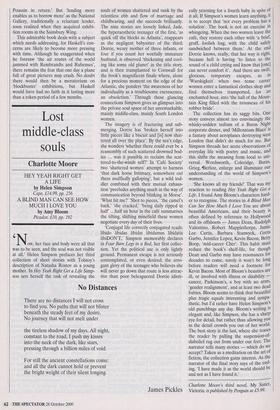Lost middle-class souls
Charlotte Moore
Now, her face and body were all that was to be seen, and the soul was not visible at all.' Helen Simpson prefaces her third collection of short stories with Tolstoy's description of Natasha Rostov as a young mother. In Hey Yeah Right Get a Life Simp- son sets herself the task of revealing the souls of women shattered and sunk by the relentless ebb and flow of marriage and childbearing, and she succeeds brilliantly. The nine stories are loosely linked. Jade, the hyperaesthetic teenager of the first, 'as quick off the blocks as Atlanta', reappears as the negligent babysitter of the third; Dorrie, weary mother of three infants, or four if you count her woefully immature husband, is observed 'thickening and cool- ing like some old planet' in the title story, and is then transplanted to Cornwall for the book's magnificent finale where, alone for a precious moment on the edge of the Atlantic, she ponders 'the awareness of her individuality as a troublesome excrescence, an obsoletism.' Through these glancing connections Simpson gives us glimpses into the private soul space of her unremarkable, mainly middle-class, mainly South London women.
The imagery is of fracturing and sub- merging. Dorrie has 'broken herself into little pieces like a biscuit and [is] now shat- tered all over the place'. By the sea's edge, she wonders 'whether there could ever be a reassembly of such scattered drowned bod- ies ... was it possible to reclaim the scat- tered-to-the-winds self?' In 'Café Society' two 'shattered women' attempt to harness `that dark horse Intimacy, somewhere out there muffledly galloping', but a wild tod- dler combined with their mutual exhaus- tion 'precludes anything much in the way of communication beyond blinking in Morse'. `What hit me?' Shot.to pieces,' the camel's back,' she cracked,' being daily ripped in half ...half an hour in the café summarises the tilting, shifting minefield these women negotiate every day of their lives.
`Conjugal life correctly conjugated reads: libido libidas libidat libidamus libidatis libiDON'T,' Simpson memorably declares in Four Bare Legs in a Bed, her first collec- tion. Yet the political axe is only lightly ground. Permanent escape is not seriously contemplated, or even desired; the arro- gant glory of the teenager who believes she will never go down that route is less attrac- tive than poor beleaguered Dorrie idioti- cally yearning for a fourth baby in spite of it all. If Simpson's women learn anything, it is to accept that 'not every problem has a solution'. The book is not an exercise in whingeing. When the two women leave the café, they restore each other with 'a brief, gruff, foolish hug, with the child safely sandwiched between them.' At the end Dorrie knows, really, that her way is right, because hell is having `to listen to the sound of a child crying and know that [one] can never comfort it'. And there are swift, glorious, temporary escapes, as in `Wurskigkeit' when two tense career women enter a fantastical clothes shop and find themselves transported, for an enchanted hour, into 'the hall of the Moun- tain King filled with the trousseau of his robber bride'.
The collection has its saggy bits. One story conveys almost too convincingly the whisky-sodden tedium of a Burns Night corporate dinner, and 'Millennium Blues' is a fantasy about aeroplanes destroying west London that didn't do much for me. But Simpson threads her acute observations of everyday life with poetry and music, and this shifts the meaning from local to uni- versal. Wordsworth, Coleridge, Burns, Grieg, •Berlioz, enlarge and illuminate our understanding of the world of Simpson's women.
`She knows all my friends!' That was my reaction to reading Hey Yeah Right Get a Life. I found Amy Bloom's characters hard- er to recognise. The stories in A Blind Man Can See How Much I Love You are about beautiful Americans, and their beauty is often defined by reference to Hollywood and its offshoots — James Dean, Rudolph Valentino, Robert Mapplethorpe, Jamie Lee Curtis, Barbara Stanwyck, Greta Garbo, Jennifer Lopez, Kevin Bacon, Betty Boop, 'mid-career Cher'. This habit must reduce the book's shelf-life, for though Dean and Garbo may have resonances for decades to come, surely it won't be long before readers will need a footnote for Kevin Bacon. Most of Bloom's beauties are ill, or involved with illness or disability — cancer, Parkinson's, a boy with no arms, `gender realignment', and at least two dead babies. Bloom seems to think that beautiful plus tragic equals interesting and sympa- thetic, but I'd rather have Helen Simpson's old punchbags any day. Bloom's writing is elegant and, like Simpson, she has a sharp eye for detail, but rather than allowing you in the detail crowds you out of her world. The best story is the last, where she teases the reader by pulling the suspension-of- disbelief rug out from under our feet. The narrator tells many stories — which do we accept? Taken as a meditation on the art of fiction, the collection gains interest. As the narrator of the final story says of the end- ing, 'I have made it as the world should be and not as I have found it.'
Charlotte Moore's third novel, My Sister, Victoria, is published by Penguin at £5,99.


























































































 Previous page
Previous page